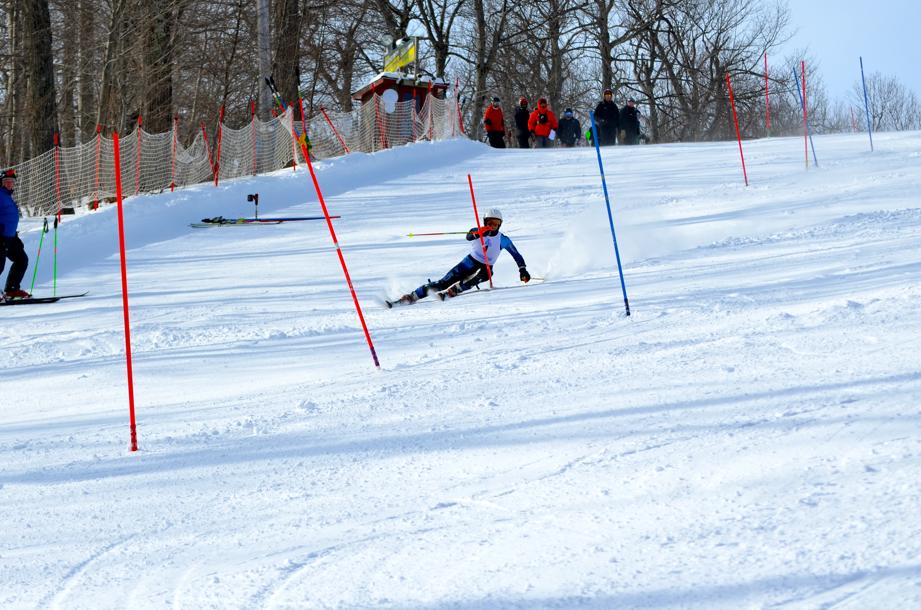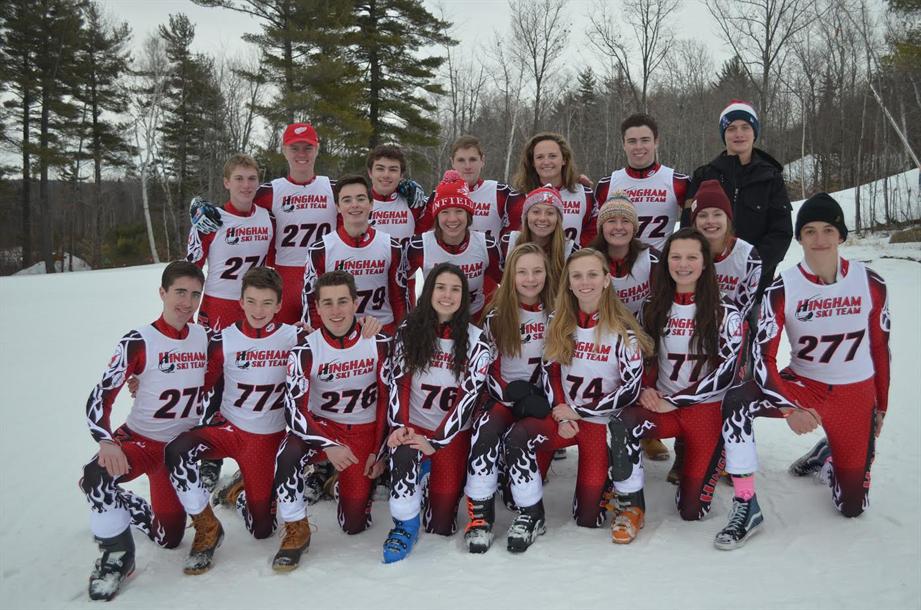

For Alpine skiers, it’s all about racer’s mentality.
From afar, it would hardly have looked like a high school ski practice.
Caitie Petersonrecalls setting up cones in a zig-zag pattern on a hill behind Westwood High School, without so much as a flake of snow on the ground. The Alpine ski coach would have her athletes simply run down the hill, imagining they were slicing through a racecourse on a real mountain.
It may seem ridiculous, but dry-land workouts are an integral part of learning how to navigate the precise turns of the slalom and giant slalom races.
Most skiers have been on the slopes for years before they race for their high schools teams. But not all of these mountain goers are used to the competitive racing environment. That’s why coaches need to teach the fundamentals; how to stay in an athletic stance, make sharp cuts out of gates, and keep pressure on the outside ski.
“I have to break them down and build them back up,’’ said Cohasset coach Jack Dane. “You learn how to ski in a fundamental manner, then you take that to the gates.’’
Hingham coach Bob Glennon says “learning how to ski like a ski racer’’ is the biggest challenge for his athletes.
Glennon led the Harbormen to a successful season in the Ski East USA league; the girls’ and boys’ teams each finished in third. A large part of the team’s development came from Glennon’s emphasis on the racing basics, even though Hingham is “a pretty big ski town.’’
“Ski racing is really about making clean, crisp turns where someone wants you to turn . . . and doing it at high speeds,’’ Glennon said. “It’s not like free skiing where you can say ‘I don’t really want to turn right now.’?’’
Senior captain Grace Barrett had skied for years at northern mountains such as Loon and Gunstock before joining the Hingham team. She only had tried going through racing gates a few times.
“As a freshman, it was really intimidating. I didn’t know what to expect,’’ said Barrett, who was on the cusp of qualifying for states this year. “You have to stay on your edge. Not just ski downhill like a free ski.’’
One of Barrett’s friends, senior Cate Diamond, joined the team this year despite not having any racing experience. Barrett said she gave her friend pointers, especially early in the season as Diamond adjusted to the racing mentality.
Diamond finished in the top 25 in Ski East. She also was a captain of the field hockey team in the fall.
“She’s a really strong athlete with really good fundamentals,’’ said Glennon, who believes an athletic background is important for a good racer.
Notre Dame Academy coach Amy Tragert says many of her skiers have experience in hockey or figure skating, and the skills translate to the mountain.
“Skiing kind of gets underrated as an athletic sport,’’ Tragert said. “People think it’s kind of easy because you’re just going down a mountain.’’
BC High junior Brian Parsons picked up ski racing as a sophomore after spending a year on the Eagles’ basketball team. Parsons finished 21st in the Ski East standings in just his second year.
“I gave it a try, and it turns out I was pretty good at it,’’ Parsons said. “Being affiliated with sports and having a passion for skiing really helped me keep up.’’
All of Xaverian’s skiers are multi-sport athletes, including seniors Jack Carmone and Sam Goldberg. The captains lead the rest of the team in drills designed to help specifically with racing. One drill involves going down the mountain on one ski to perfect balance.
The Hawks won the Mass Bay Ski League East this year, dethroning defending state champion Dover-Sherborn.
Top programs such as Xaverian tend to have a plethora of skiers with a racing background: those who have trained on club teams at mountains in Maine, New Hampshire, and Vermont. But for smaller teams, this isn’t always the case.
“Obviously, it’s great having kids who are in programs up north, but I really do love getting the kids who have never raced before,’’ Duxbury coach Abby Nolan said.
Nolan led the Duxbury girls to a third-place Mass Bay finish.
While senior captains Katherine Quinn and Julia White led the way in terms of scoring, Nolan said freshman Katie Lojko was very impressive, given her lack of racing experience.
“It feels great when the feedback connects with them,’’ Nolan said.
A few miles north in Cohasset, Dane has a promising young roster. Without a senior, skiers such as junior captain Sophie Matthews have to help guide some of the youth, just like teammates had done for her.
“I had never even gone through a race course before,’’ said Matthews, who is an alternate for states. “Even just seeing people do it helps you out more.’’
Matthews says she tries to motivate the young skiers to put their weight on the edge of their skis to get more precise turns, something that isn’t a focus of free skiers.
More experienced skiers such as Matthews, who skied for several years before joining a team at Loon, allow Dane to ratchet up the teaching.
“If I have a kid whose race background is pretty sophisticated, then we can get into some pretty funky stuff, some nuanced stuff,’’ Dane added.
But sometimes, it’s best to go back to the fundamentals. At Westwood, Peterson brings her athletes into the weight room and has them run the bleachers to prepare for the season.
“If you have strong, muscular legs, you can make your turns better and hold them out longer,’’ says junior Kristina Glynn, an 11-year ski veteran.
Glynn and sophomore Matt Kutzer are more experienced racers. Each tries to be an extension of Peterson on the mountain.
“[Coach] can’t be everywhere at once,’’ Kutzer said. “Me and the other captains just try to help out.’’
Glynn and Kutzer aren’t immune to tweaks in their technique, however.
“I’ve got some kids who’ve been free skiing their whole life and had to adjust their form,’’ Peterson said.
But for all the racing fundamentals and techniques, one simple lesson remains true. For first-time racers especially, sometimes you have to fail to succeed.
“The kids have to be willing to make mistakes and try out different things,’’ Peterson said. “If you’re not falling in practice, you’re not pushing yourself hard enough.’’
Matt MacCormack can be reached at matt.maccormack@globe.com.


 PREVIOUS ARTICLE
PREVIOUS ARTICLE